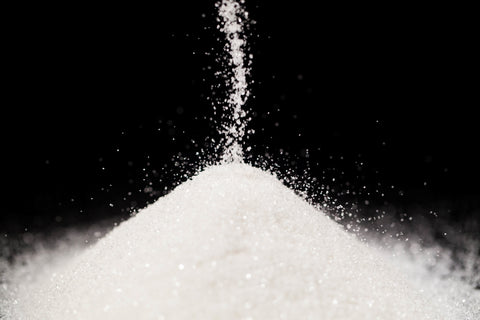Erythritol safety :
In 2001, the FDA classified erythritol as “generally recognized as safe” substance for use by the general population as a sweetener. In the European Union, The European Food Safety Authority (EFSA) approved erythritol in 2003 as safe for use as a non-sweetening food additive. Later, in 2006, it was permitted as sweetener for use in all food applications as with other polyols. The EFSA authorized erythritol use in beverages as non-sweetening additive in 2010, and as sweetener in 2015. The safety of erythritol is based on extensive evidence from animal and human studies on its absorption, distribution, metabolism, and excretion.
Erythritol advantages :
Evidence shows erythritol has potential as a beneficial replacement for sugar in healthy and diabetic subjects as it exerts no effects on glucose or insulin and induces gut hormone secretions that modulate satiety to promote weight loss.
The most valuable properties of these sugar alcohols are their sweetness and low calorie content combined with being non-cariogenic. Along with the artificial sweetener sucralose, it is the only polyol that is non-caloric, providing no energy to the body. The majority of erythritol cannot be metabolized by the human body and is excreted unmodified into the urine without changing blood glucose and insulin levels. Long-term rodent studies show erythritol consumption lowers body weight or adiposity. It has anti-oxidant activity while circulating the body before it is excreted into the urine.
Effects of Erythritol on oral health :
Erythritol may play a number of functional roles to actively support the maintenance of oral health. Studies have found that erythritol can reduce dental plaque, reduce plaque acids, reduce the number of mutans streptococci in saliva, and reduce the risk of tooth decay.
Effects of erythritol on glycemia and Insulin secretion :
Studies in human subjects have clearly demonstrated that acute doses of erythritol do not affect blood levels of glucose or insulin. Compared to the glucose reference score of 100 for both indices, the glycemic index for erythritol is 0, and the insulinemic index is 2. While these characteristics make erythritol potentially beneficial for subjects with diabetes, obesity and cardiometabolic disease.
Effects of erythritol on energy intake and body weight :
Studies in humans have shown that erythritol administration stimulated the secretion of gut hormones modulating satiety and energy intake. The authors suggest that the effects of erythritol on the satiety/appetite hormones are due to it having a higher osmolality (measure of the total number of dissolved molecules in a liquid) than sucrose (table sugar). While erythritol is an non-nutritive replacement of added sugar it can also promote satiety hormone secretion.
Erythritol inconvénients :
However, it is important to note that erythritol may have a mild laxative effect in some people.
Erythritol application :
The range of applications for erythritol is still growing. It’ currently used in combination with other polyols in foods, cosmetics, and pharmaceuticals. Erythritol is mainly utilized as sweetener to balance the finished product with regard to its characteristics, such as flavor, color, and texture. Erythritol can therefore be used to produce no-sugar added, reduced-sugar, or sugar-free alternatives. Erythritol as sugar replacement can be found as tabletop sweetener, in beverages, chewing gum, chocolate, candies, and in bakery products. Polyols are commonly used in toothpaste, mouthwashes, creams and lotions, make-up, perfumes or deodorants. For pharmaceutical use, because of its properties, erythritol offers good flowability and stability, making it an ideal carrier for actives in sachets and capsules.
The Metabolism of Erythritol :
Conclusion : Sources : https://www.ncbi.nlm.nih.gov/
The sugar alcohols are absorbed from the small intestine. Also is absorbed into the blood at a higher and faster rate than the larger sugar alcohols. Once in the blood, a major proportion of erythritol is un-metabolized and excreted unchanged in the urine. It has mainly been assumed that the relatively small amount of unabsorbed erythritol passes to the colon. This indicated that the nearly all of the absorbed erythritol was not metabolized systemically and the unabsorbed portion that transitioned to large intestine was not metabolized by gut microbiota.
Over time, different approaches have been applied to increase the production of erythritol. Because the demand of erythritol increased in a short time, the commercial availability became most important.
Erythritol is a naturally occurring, safe, and non-nutritive sugar alcohol. Compared to other sugar alcohols, evidence from human studies indicate that it is mostly absorbed and excreted in urine unmetabolized. Therefore, it is better tolerated, with less undesirable gastrointestinal effects.
Consumption of erythritol does not increase circulating glucose or insulin. The scientific evidence demonstrating that consumption of erythritol has beneficial effects on oral health is strong.



